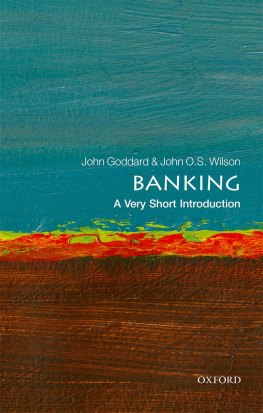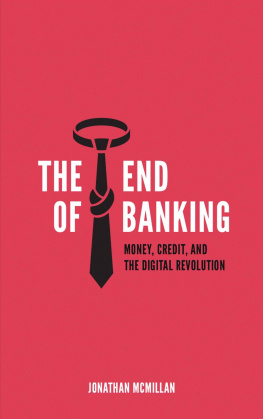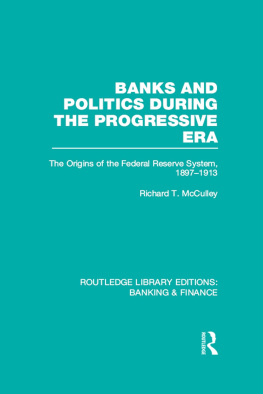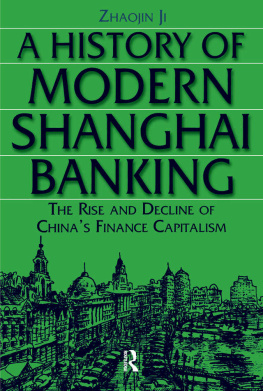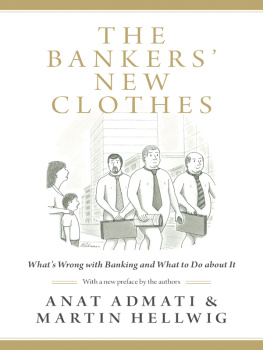coll. - Banking on Reform
Here you can read online coll. - Banking on Reform full text of the book (entire story) in english for free. Download pdf and epub, get meaning, cover and reviews about this ebook. year: 0, genre: Politics. Description of the work, (preface) as well as reviews are available. Best literature library LitArk.com created for fans of good reading and offers a wide selection of genres:
Romance novel
Science fiction
Adventure
Detective
Science
History
Home and family
Prose
Art
Politics
Computer
Non-fiction
Religion
Business
Children
Humor
Choose a favorite category and find really read worthwhile books. Enjoy immersion in the world of imagination, feel the emotions of the characters or learn something new for yourself, make an fascinating discovery.

Banking on Reform: summary, description and annotation
We offer to read an annotation, description, summary or preface (depends on what the author of the book "Banking on Reform" wrote himself). If you haven't found the necessary information about the book — write in the comments, we will try to find it.
coll.: author's other books
Who wrote Banking on Reform? Find out the surname, the name of the author of the book and a list of all author's works by series.
Banking on Reform — read online for free the complete book (whole text) full work
Below is the text of the book, divided by pages. System saving the place of the last page read, allows you to conveniently read the book "Banking on Reform" online for free, without having to search again every time where you left off. Put a bookmark, and you can go to the page where you finished reading at any time.
Font size:
Interval:
Bookmark:
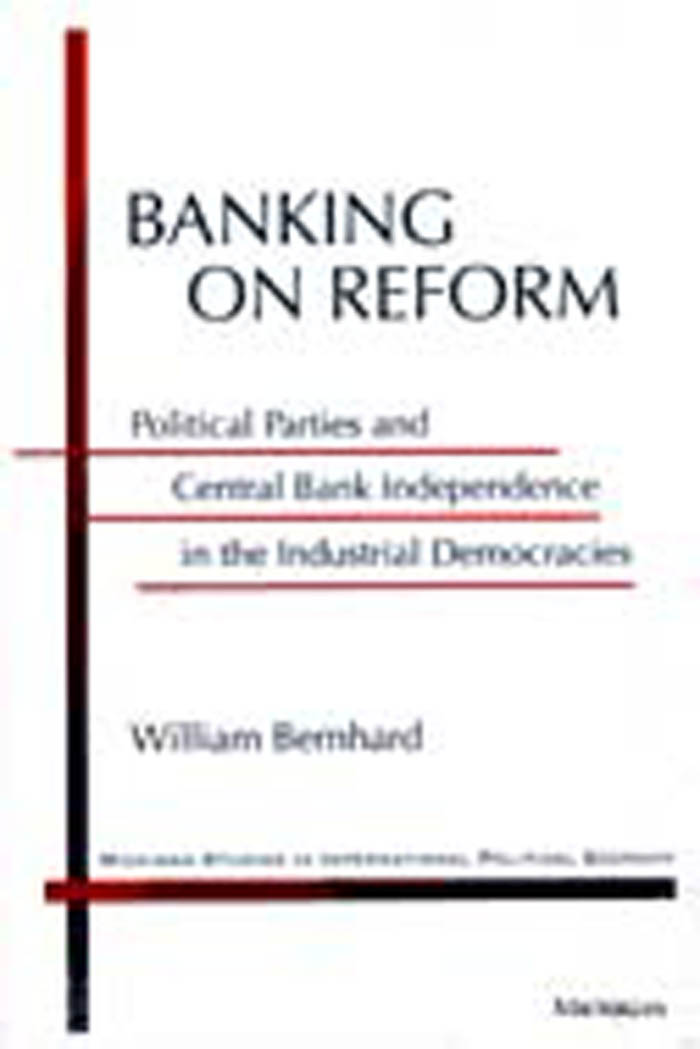
Banking on Reform
Michigan Studies in International Political Economy
SERIES EDITORS : Edward Mansfield and Lisa Martin
Michael J. Gilligan
Empowering Exporters: Reciprocity, Delegation, and Collective Action in American Trade Policy
Barry Eichengreen and Jeffry Frieden, Editors
Forging an Integrated Europe
Thomas H. Oatley
Monetary Politics: Exchange Rate Cooperation in the European Union
Robert Pahre
Leading Questions: How Hegemony Affects the International Political Economy
Andrew C. Sobel
State Institutions, Private Incentives, Global Capital
Roland Stephen
Vehicle of Influence: Building a European Car Market
William Bernhard
Banking on Reform: Political Parties and Central Bank Independence in the Industrial Democracies
Political Parties and Central Bank Independence
in the Industrial Democracies
W ILLIAM B ERNHARD
Ann Arbor
T HE U NIVERSITY OF M ICHIGAN P RESS
Copyright by the University of Michigan 2002
All rights reserved
Published in the United States of America by
The University of Michigan Press
Manufactured in the United States of America
 Printed on acid-free paper
Printed on acid-free paper
2005 2004 2003 2002 4 3 2 1
No part of this publication may be reproduced, stored in a retrieval system, or transmitted in any form or by any means, electronic, mechanical, or otherwise, without the written permission of the publisher.
A CIP catalog record for this book is available from the British Library.
Library of Congress Cataloging-in-Publication Data applied for
ISBN 0-472-11254-6
ISBN13 978-0-472-11254-8 (cloth)
ISBN13 978-0-472-02313-4 (electronic)
For Jen
This project evolved from my graduate work at Duke University. My greatest intellectual debt goes to my dissertation advisor, Peter Lange. Peter has shaped this project in innumerable direct and perhaps more significantly, indirect ways. I thank him for his guidance, advice, and above all, patience. Bob Bates and Herbert Kitschelt also strongly influenced my intellectual development. Their research and teaching exemplify what political science should be. Special thanks are also due to William Bianco and Emerson Niou, who provided invaluable assistance during the process both as dissertation committee members and more importantly, as friends. Other (past and present) Duke faculty members who offered advice, encouragement, and criticism include John Aldrich, John Brehm, Paul Gronke, Tom Havrilesky, and Beth Simmons. While I was at Duke, the project also benefited from a dynamic and collegial cohort of graduate students: Clark Gibson, Dean Lacy, Brian Loynd, Howard Lubert, Layna Mosley, Phil Paolino, Matt Schousen, Patrick Sellers, Regina Smyth, and Ned Walpin.
Although many people have contributed to this project, a few individuals have gone above and beyond the call of duty. Kathryn Firmin-Sellers, Rob Franzese, Jim Granato, Torben Iversen, and David Leblang merit special thanks for their kind and gracious assistance. Each has read the entire manuscript at least once and offered extensive comments and recommendations.
In addition, I have received helpful advice and encouragement from Jim Alt, Alison Alter, Lawrence Broz, Kelly Chang, William Clark, Maria Green Cowles, Mark Crescenzi, William Downs, John Freeman, Jeff Frieden, Matt Gabel, Mark Hallerberg, John Huber, Erik Jones, Karl Kaltenthaler, William Keech, Kate McNamara, Burt Monroe, Irwin Morris, Thomas Oatley, Sofia Perez, Ron Rogowski, Andy Sobel, David Stasavage, and Daniel Verdier. Seminar participants at Harvard University, the Political Economy Program at Harvard University, Franklin & Marshall College, Indiana University, and the University of North Texas also made valuable comments.
My colleagues at both Dartmouth College and the University of Illinois also deserve thanks for their time and advice. At Dartmouth, Darren Hawkins, Jim Hentz, Dave Kang, Catherine Shapiro, Joao Resende-Santos, and Jim Shoch provided intellectual stimulation. At Illinois, Lee Alston, Bear Braumoeller, Brian Gaines, Gerry Munck, Larry Neal, Bob Pahre, Brian Sala, and Richard Snyder made comments and suggestions. The University of Illinois Department of Political Science and the University Research Board provided the resources necessary for the completion of the project.
Fieldwork was made possible by a Fulbright Grant to the European Communities. As a Visiting Research Fellow at the Centre for European Policy Studies, I interacted with Peter Ludlow and Daniel Gros. Ivo Maes of the National Bank of Belgium also deserves thanks for helping me acclimate to the world of central banking in Europe.
I thank Robert Franzese, Torben Iversen, David Leblang, Adam Posen, and Dennis Quinn for sharing data. Chad Atkinson and Sang-Hyun Lee provided able research assistance.
Central Bank Independence
Central banks stand at the intersection of economics and politics. These bureaucratic institutions implement monetary policy by regulating the supply of money and credit to the economy. Both academic and popular accounts emphasize how a countrys central bank significantly shapes its economic destiny (e.g., Beckner 1996; Deane and Pringle 1995; Greider 1987; Marsh 1992). In many countries, opinion polls and newspaper stories recognize central bankers as the most influential nonelected public officials.
Although central banks perform a similar function across the industrial democracies, their institutional structurestheir levels of independencediffer across systems. The structure of an independent central bank restricts the governments ex-ante and ex-post influence over monetary policy, often by limiting the number of cabinet appointees on a banks governing board, by preventing the cabinet from vetoing the banks policy decisions, and by prohibiting the cabinet from punishing central bankers through dismissal or budget cuts. A dependent central bank, on the other hand, places few limitations on the governments authority.
In the 1970s and 1980s, only a few central banks were independent; the majority of industrial democracies had dependent central banks. In the 1990s, however, this distribution shifted significantly as many countries legislated more independence for their central banks. Most dramatically, European Union (EU) member states agreed to a single currency under the administration of an independent central bank. In this book, I explain these patterns of central bank independence.
Throughout most of the postWorld War II period, only a few industrial democracies, including Germany, Switzerland, and the United States, possessed independent central banks. The German Bundesbank, for example, is generally recognized as one of the most independent central banks in the world (Deutsche Bundesbank 1989; Goodman 1992; Kennedy 1991; Marsh 1992; Sturm 1989). The German federal government appoints only a minority of the Central Bank Council, the banks main decision-making body. Further, the government cannot veto the banks decisions, although it may delay for two weeks the implementation of a bank decision.
In countries such as Britain, Italy, and France, on the other hand, the government retained full control over the central banks policy actions. In Britain, for example, the government appointed the entire governing board and could veto the banks policy decisions. The Treasury dictated the Bank of Englands policies (Fay 1988). Nigel Lawson, a former chancellor of the Exchequer, described the relationship between the government and the bank in this way, I make the decisions and the Bank carries them out (
Font size:
Interval:
Bookmark:
Similar books «Banking on Reform»
Look at similar books to Banking on Reform. We have selected literature similar in name and meaning in the hope of providing readers with more options to find new, interesting, not yet read works.
Discussion, reviews of the book Banking on Reform and just readers' own opinions. Leave your comments, write what you think about the work, its meaning or the main characters. Specify what exactly you liked and what you didn't like, and why you think so.








